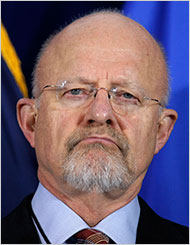Director of National Intelligence James Clapper’s Senate testimony today covered a broad selection of topics, and included the usual scaremongering about Iran’s “nuclear weapons program.” The buried lead is the admission that Iran isn’t actually building nuclear weapons and there are no indications that Iran plans to try.
 The more publicized story is that Clapper addressed the putative assassination plot against the Saudi Ambassador to the United States, saying it showed Iran was “more willing to conduct an attack in the United States in response to real or perceived US actions.”
The more publicized story is that Clapper addressed the putative assassination plot against the Saudi Ambassador to the United States, saying it showed Iran was “more willing to conduct an attack in the United States in response to real or perceived US actions.”
Nevertheless, the administration was never able to tie Iran to that plot with any direct evidence. Analysts saw the whole allegation as downright silly and mired with a needlessly convoluted plot involving Iran supposedly recruiting a failing used-car dealer from Texas to introduce the government to some drug cartels in the hope that they’d be interested in killing the ambassador.
The second part of Clapper’s statement – “in response to real or perceived US actions” – deserves more focus. Though never admitting it, the US has presumably been involved in the assassination of top Iranian scientists on a regular basis. Likewise, the US has been linked to funding for terrorist organization Jundallah, which has killed large numbers of Iranian civilians, although recent evidence suggests that the CIA may well have been framed by Mossad in this affair.
Indeed, Clapper went on to reiterate this warning, saying that Iran might well sponsor future attacks on US soil or against US targets abroad on the basis of “Iranian leaders’ perceptions of US threats against the regime.”
Those US threats are significant. The Obama Administration threatens to attack Iran more or less on a weekly basis. That the US has been making such threats for almost 30 years does temper their credibility, but with the US linked to a number of actual attacks inside Iran, the lesson is clear. Clapper’s warning indicates that the intelligence community believes that America’s policy of overt hostility and covert violence against Iran is liable to lead to serious blowback in the form of Iranian retaliation.



